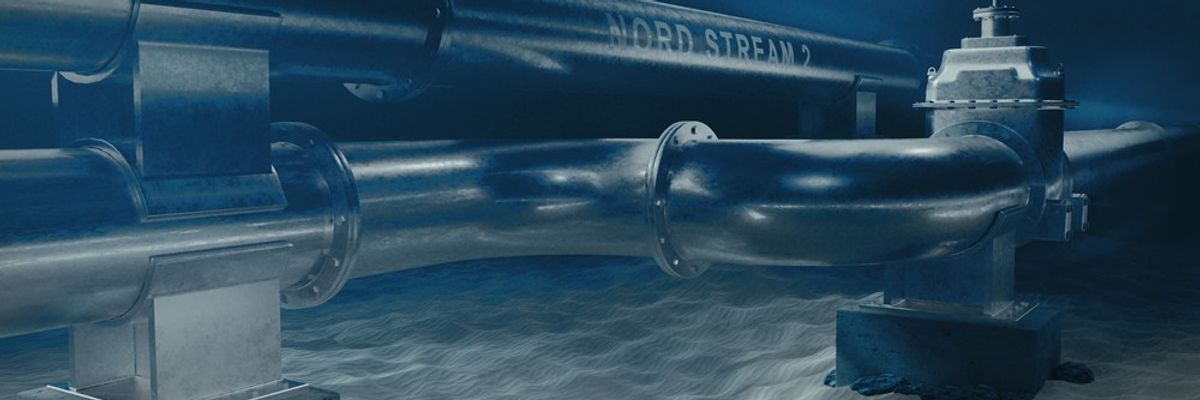Two stunning explosions deep below the Baltic Sea last month set off one of the greatest whodunits in the long history of US-Russia hostility.
The explosion ruptured a pipeline that was built to bring liquid natural gas from Russia to Germany. That is likely to reshape European life. It will drive up energy prices as winter begins while removing an instrument Russia has used to influence European governments. The attack also illustrates the profound but little-understood importance of pipelines in modern geopolitics. This is the first major sabotage of an important international pipeline. Now that a precedent has been set, it may not be the last.
The pipeline that was attacked, called Nord Stream 2, was a joint Russian-German project that the United States opposed from the start. In February President Biden promised that if Russia invaded Ukraine, “there will no longer be a Nord Stream 2. We will bring an end to it.” When asked how that would be possible, he replied, “I promise you, we would be able to do that.” After the September 26 attack, Secretary of State Antony Blinken called it “a tremendous opportunity once and for all to remove the dependence on Russian energy…We’re now the leading supplier of LNG to Europe.”
Germany and other countries that planned to use liquid natural gas from Russia may now have to buy it from the United States. Hours after the explosion, former Polish defense minister Radek Sikorski tweeted a picture of the methane bubble rising from the Baltic with the caption “Thank you USA.” In a second tweet he elaborated: “Nord Stream’s only logic was for Putin to be able to blackmail or wage war on Eastern Europe with impunity.”
The pipeline is heavily armored, with layers of concrete surrounding tubes made from metal alloys. Most who have studied the attack agree that it could only have been carried out by a “state actor.” The United States, Britain, Russia, and possible Germany, Sweden, and Denmark, are thought to be the only countries with the undersea power to carry it off. Once accomplished, the action removed the most important tool Russia had to pressure Germany—and perhaps assured that Germany will not stray from the US policy of arming Ukraine. Circumstantial evidence suggests that this could have been an American operation.
Journalists and other professional skeptics, however, realize that some things that seem obvious and just plain common sense are actually not true. Russia may not have undersea commandos able to plant powerful explosives along the pipeline, but it could have been blown up from inside. Russia, which controls access to the pipeline, could have carried out the attack that way. Why would it blow up its own pipeline? According to those who support this theory, the motive would be to drive gas prices higher and push Europeans into freezing darkness so they would press their leaders to stop supporting Ukraine.
The executive director of the International Energy Agency, Fatih Birol, asserted soon after the sabotage attack that it was “very obvious” who did it, but refused to say more. Sweden is investigating but will not reveal what it discovers because, according to a Swedish official, “that is subject to confidentiality directly linked to national security.” A member of the German parliament asked what Germany’s government knows, and the government reportedly replied that it could not answer because “even the slight risk of disclosure cannot be accepted.”
This mystery will probably not be resolved soon, or perhaps ever. The sabotage of Nord Stream is just the latest and most spectacular example of how vital pipelines are to the political and economic security of many nations.
Conflict over a pipeline led the CIA to participate in its first regime-change operation. In 1949 the first president of independent Syria, Shukri al-Quwatli, refused to allow a consortium of American oil companies to run the Trans-Arabian Pipeline across his country. That defiance led the CIA to promote a military coup that deposed Quwatli and installed a military-led government that quickly approved the pipeline. Syria never returned to democracy.
In the 1990s, the United States exercised intense pressure to assure that new pipelines from rich fields in the former Soviet Union would not run through Iran or other unfriendly countries. Russia has periodically raised or lowered the price of gas from its pipelines according to whether particular governments are friendly or hostile. China is using pipelines as part of its ambitious Belt and Road initiative that seeks to bind Eurasia together under Chinese influence. In 2014, after Russia’s annexation of Crimea, the European Union blocked a proposed pipeline that would have carried Russian gas to Austria and Italy.
Most pipelines are vulnerable. One candidate for future sabotage might be Turkstream, designed to carry gas from Russia to Turkey and then on to Bulgaria, Hungary and Serbia — all countries that have been reluctant to support Ukraine. A “pipeline war” could lie ahead.
So who blew up the Nord Stream pipeline? Thousands of unexploded mines from World Wars I and II still litter the Baltic. Blaming one of those mines would be most convenient. That would allow all to believe that this was an unfortunate accident, not an act of international vandalism. There’s no hard evidence to support that theory, but neither is there any to support the charge that the culprit was the United States or Russia. That may keep speculation bubbling like the methane gas that exploded from under the Baltic last month.
















